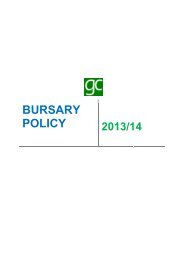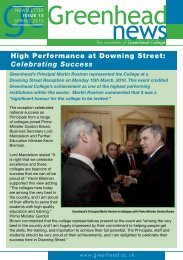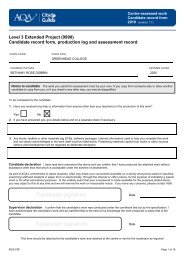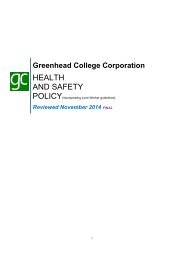ABSENCE POLICY - Greenhead College
ABSENCE POLICY - Greenhead College
ABSENCE POLICY - Greenhead College
You also want an ePaper? Increase the reach of your titles
YUMPU automatically turns print PDFs into web optimized ePapers that Google loves.
<strong>Greenhead</strong> <strong>College</strong><br />
Corporation<br />
<strong>ABSENCE</strong><br />
<strong>POLICY</strong><br />
V:\Julie\Policies\Absence policy.doc<br />
- 1 -
GREENHEAD COLLEGE<br />
SICKNESS <strong>ABSENCE</strong> AND ILL HEALTH <strong>POLICY</strong><br />
<strong>Greenhead</strong> <strong>College</strong> values the contribution of its staff in the successful running of the<br />
college and the provision of education to its students. Whilst recognising that<br />
employees may be prevented from attending work through ill health, the college has<br />
a duty to maintain services and minimise disruption. The college is therefore<br />
committed to managing attendance and sickness absence and believes that it is the<br />
responsibility of the college’s managers, trade union representatives and employees<br />
to work together to promote the management of sickness absence and ill health.<br />
The college will achieve this through:<br />
Promoting the health, safety and well being of all employees, including use of<br />
risk assessments to identify and manage hazards impacting on health in the<br />
workplace<br />
Monitoring levels of sickness absence for individuals, teams and the college<br />
as a whole<br />
Implementing procedures to support and manage staff absences, whilst<br />
dealing with unjustified and/or high levels of sickness absence.<br />
The following principles apply to the college’s procedure for dealing with sickness<br />
absence:<br />
Good attendance is valued and all opportunities should be taken to<br />
acknowledge and recognise such attendance<br />
Matters raised relating to an employee’s absence do not imply any distrust of<br />
staff or concerns regarding their conduct<br />
Sickness absence will be dealt with in a way that is non-discriminatory and in<br />
<br />
accordance with the college’s Equal Opportunities policy<br />
Employees will be dealt with consistently and the sickness absence<br />
procedures will be applied fairly across the college<br />
The college will aim to promote a positive and preventative rather than<br />
punitive approach<br />
The college will be sensitive and supportive to those suffering the effects of ill<br />
health<br />
Sickness absence cases will be conducted with respect for confidentiality and<br />
in accordance with the requirements of the Data Protection and Access to<br />
Medical Reports Acts<br />
Open communication between managers and staff will be encouraged and<br />
promoted<br />
The college will aim to distinguish between absence due to sickness and the<br />
abuse of the sickness absence system<br />
The sickness absence policy and procedure will be monitored and reviewed to<br />
ensure that it continues to meet the college’s aims and complies with these<br />
principles.<br />
V:\Julie\Policies\Absence policy.doc<br />
- 2 -
Employees are expected to:<br />
Attend work unless unfit to do so<br />
Raise concerns with their Head of Department, Line Manager or the HR<br />
Manager if they believe that their job is making them ill or contributing to<br />
illness<br />
Report sickness absence promptly, in accordance with the sickness absence<br />
procedure<br />
Ensure that the appropriate certifications are completed, in accordance with<br />
this procedure<br />
Maintain contact with their manager or a member of the admin team during<br />
periods of sickness absence<br />
Communicate effectively with their manager or the HR Manager about their<br />
sickness absence<br />
Co-operate fully with an occupational health doctor and/or other organisations<br />
that provide support to the college and its employees<br />
Ensure that medical advice and treatment, where appropriate, is received as<br />
quickly as possible in order to facilitate a return to work<br />
Not abuse the sickness absence procedures or sick pay scheme.<br />
In order to support this policy, the following services are available to managers and<br />
employees:<br />
The college is willing to pay for an occupational health service opinion, if<br />
necessary, to provide advice and guidance on the impact of ill health on work<br />
and what steps the college and/or employee can take<br />
Counselling Service – to provide a confidential service to employees in order<br />
to discuss concerns related to work or personal circumstances<br />
The Admin Team together with the HR Manager – to provide support and<br />
guidance to managers and employees in dealing with sickness absence and ill<br />
health and in the use of the college’s related policies and procedures.<br />
Approved by the Policy committee May 2011<br />
Approved by the Corporation June 2011<br />
“This policy has been impact assessed to ensure it complies with all aspects of Equality and<br />
Diversity. Members are reassured that this policy is compliant<br />
with current equality legislation”.<br />
Policy Owner: John Blake – <strong>College</strong> Business Manager<br />
V:\Julie\Policies\Absence policy.doc<br />
- 3 -
Procedure<br />
The following procedure applies to all employees of <strong>Greenhead</strong> <strong>College</strong>, in<br />
accordance with the college’s Sickness Absence and Ill Health Policy.<br />
1. Notifying Absence<br />
In order for service delivery to be maintained, it is essential for the college to<br />
know when a member of staff is unable to attend work due to illness. Failure<br />
to inform the college office of absence may lead to the absence from work<br />
being considered as unauthorised, resulting in loss of pay and possibly<br />
disciplinary action.<br />
The employee must contact Reception and their Line Manager, if necessary,<br />
on the first day of absence; before they are due to begin work. In the case of<br />
sudden serious illness or accident, then contact should be made as soon as<br />
possible by the employee or relative/friend.<br />
The employee must provide details of their illness or injury, their anticipated<br />
length of absence and any work commitments that need rearranging.<br />
If the employee believes that their absence may have been caused by<br />
something that happened at work they should mention this and arrange for an<br />
Accident Report Form to be completed.<br />
Exceptionally, if the employee is unable to telephone in person, they must<br />
arrange for someone else to telephone on their behalf. The employee must<br />
make direct contact with the college as soon as possible thereafter.<br />
The college must ensure that the Report of Absence Form is completed and<br />
information available for payroll.<br />
Teaching staff are expected to attend the morning briefing, which highlights<br />
staff who are absent and follow up procedures can then be activated. Parttime<br />
staff should attend if part of their working time.<br />
2. Certification<br />
Every absence must be certified to ensure correct and prompt payment of<br />
contractual and statutory sick pay and to ensure that accurate records are<br />
maintained. Failure to comply with certification procedures may result in loss<br />
of sick pay. Misleading or false statements may be dealt with under the<br />
college’s disciplinary procedure.<br />
The employee must complete a Report of Absence Form from day one of any<br />
absence. If the absence is for less than seven days the form can be<br />
completed upon return to work.<br />
V:\Julie\Policies\Absence policy.doc<br />
- 4 -
If the employee is absent for more than seven consecutive days, (regardless<br />
of whether or not these are working days), they must consult a doctor and<br />
obtain a medical certificate, which must be forwarded immediately to the<br />
college.<br />
Where there is continuing sickness absence the employee must submit to the<br />
college concurrent medical certificates to cover the whole period of absence.<br />
Where the period of absence exceeds fourteen days the employee must<br />
submit, upon return to work, a medical certificate or statement of fitness to<br />
resume work from their doctor.<br />
The HR Manager will ensure that timely and appropriate certificates are<br />
received from the employee and that they are shared with the Head of Payroll.<br />
The HR Manager must ensure that certificates are recorded on the Report of<br />
Absence Form so that accurate records are kept on each employee.<br />
Line Managers must check that Reception has been notified of the absence so<br />
that the information is recorded on the Sickness Absence System.<br />
Exceptionally, if the manager is concerned at the frequency of an employee’s<br />
absence, or their account of their reasons for absence, the employee may be<br />
required to submit doctor’s medical certificates, rather than self-certificates,<br />
from their first day of absence. In such cases the college will meet the cost of<br />
any fee charged.<br />
3. Maintaining Contact<br />
When an employee is absent from work due to sickness it is important that<br />
contact is maintained between the college, manager and the employee. The<br />
manager needs to ensure that work is re-allocated and service delivery is<br />
maintained. The employee needs to ensure that they do not feel isolated,<br />
vulnerable or out of touch.<br />
The employee and line manager should maintain contact during the early<br />
stages of sickness absence due to our duty of care and attention of<br />
employees.<br />
If an employee is absent from work for more than three weeks, the line<br />
manager or appropriate representative of the college should arrange with the<br />
employee to visit them at home/hospital etc.<br />
If absences become long-term, contact must be maintained.<br />
4. Monitoring Sickness Absence Levels<br />
All sickness absence should be recorded on the college’s Sickness Absence<br />
System, which will be maintained and monitored by the Senior Finance<br />
Officer.<br />
V:\Julie\Policies\Absence policy.doc<br />
- 5 -
Each manager should monitor sickness absence levels within their teams and<br />
take further action where necessary when trigger points are reached and/or<br />
where there are concerns about an employee’s absence levels.<br />
5. Return to Work<br />
Return to work meetings are usually carried out in an informal manner<br />
between the colleague and the immediate line manager.<br />
For colleagues requiring additional support returning to the workplace (such as<br />
those returning following an accident, or long term absence), this is offered on<br />
an individual basis as part of the wellbeing package the <strong>College</strong> has in place;<br />
the HR Manager and <strong>College</strong> Business Manager work together informally on<br />
this, on a case by case basis.<br />
If there are concerns surrounding a colleague’s absence record, these are<br />
usually addressed verbally in the first instance with the immediate line<br />
manager or within the HR office.<br />
V:\Julie\Policies\Absence policy.doc<br />
- 6 -
6. Dealing with Frequent Short-term Absence<br />
Where an employee’s absence level meets one of the following trigger points,<br />
the manager will review the absence levels with the employee:<br />
Three or more separate instances of sickness absence in any threemonth<br />
period<br />
Ten or more days’ sickness absence in a three-month period<br />
Any other recurring recognisable patterns, such as frequent<br />
absenteeism on a Friday or Monday.<br />
A review meeting will be held with the employee to discuss the absence<br />
record, explore the reasons for absence, identify areas for support,<br />
review/update the risk assessment, set targets for improvement and clarify<br />
what further action may be taken if improvement targets are not met.<br />
The following outcomes may be agreed:<br />
The employee may be required to submit a medical certificate from<br />
their doctor for every instance of absence<br />
Advice may be sought from a occupational health doctor (see 12<br />
below)<br />
Other support mechanisms may be identified and implemented<br />
Reasonable adjustments, such as changes to the workload, work<br />
practices or work pattern or the possibility of redeployment may be<br />
identified (subject to occupational health agreement)<br />
A further meeting may be arranged to review progress.<br />
Any other agreed action<br />
The line manager will write to the employee within 5 days of the meeting<br />
confirming the points discussed and actions agreed. A copy of this letter will<br />
be placed on the personnel file.<br />
If there is insufficient improvement in the employee’s sickness absence<br />
record, a final review meeting will be held, by a member(s) of the Admin<br />
Team/ HR Manager. This review meeting will reaffirm the issues discussed at<br />
previous reviews, identify support provided to the employee and what further<br />
support may be appropriate, set targets for improvement and warn of the<br />
consequences if no improvement. A trade union or other representative may<br />
accompany the employee.<br />
The Admin Team member/HR Manager will write to the employee within 5<br />
days of the final review meeting, confirming the points discussed and actions<br />
agreed. A copy of this letter should be placed on the personnel file.<br />
If there is insufficient improvement following the final review meeting, the<br />
matter will be referred to the Principal who will determine whether to hold a<br />
Case Review Hearing (see 8 below).<br />
V:\Julie\Policies\Absence policy.doc<br />
- 7 -
7. Dealing with Long-term Absence<br />
Absences over 28 days’ duration shall be considered long-term, this includes<br />
weekends.<br />
The Line Manager,member of the Admin Team or HR Manager should<br />
arrange to meet with the employee on a regular basis, to be arranged at a<br />
mutually convenient venue, in order to keep up-to-date with progress, identify<br />
areas for support and determine whether any other actions should be taken.<br />
A trade union or other representative may accompany the employee.<br />
Where it is evident that an absence is to continue for more than two/three<br />
months, advice should be sought from an occupational health practitioner, in<br />
accordance with the process for referral. This is a guide only and depending<br />
on the circumstances, occupational health referral may be earlier or later than<br />
the two/three-month period. The purpose of gaining an occupational health<br />
doctor’s advice will be to provide an indication of the likely duration of the<br />
employee’s absence and whether any steps can be taken to help the<br />
employee to return to work.<br />
Depending upon the advice received from the occupational health doctor, one<br />
or more of the following actions may be taken:<br />
Review periods may be set, with further advice obtained from the<br />
occupational health doctor<br />
Reasonable adjustments, such as changes to the workload, work<br />
practices or work patterns may be identified and implemented, either as<br />
part of phasing the employee back to work or on a more permanent<br />
basis<br />
Other support mechanisms may be identified and implemented<br />
Decisions may be made about the employee’s continued employment,<br />
leading to the decision to dismiss the employee due to their incapability<br />
to undertake their job due to ill health<br />
Any actions being contemplated will be discussed with the employee<br />
and their representative, if applicable, before any final decisions are<br />
made.<br />
8. Case Review Hearings<br />
Where there are continuing concerns regarding short-term absences and<br />
previous warnings have been given, or where a long-term period of absence is<br />
continuing and options to enable the employee to remain in employment have<br />
been unsuccessful, the employee may be asked to attend a Case Review<br />
Hearing.<br />
The purpose of the Case Review Hearing will be to consider whether there are<br />
any further actions that the college can take to assist the employee in<br />
continuing their employment or whether employment should be terminated<br />
due to the employee’s incapability to undertake their duties effectively<br />
because of ill health.<br />
V:\Julie\Policies\Absence policy.doc<br />
- 8 -
The Principal, accompanied by the HR Manager, will hear the Case Review<br />
Hearing.<br />
A trade union or other representative may accompany the employee.<br />
The employee will be given at least 10 days’ written notice of the intention to<br />
hold a Case Review Hearing.<br />
The employee will be given the opportunity to state their case.<br />
Others involved in the case such as the line manager will also be asked to<br />
provide information on what actions have been taken.<br />
When reaching a decision about whether or not to terminate employment, the<br />
Principal will consider issues such as:<br />
The need for the work to be undertaken<br />
The impact of the employee’s absence and ill health on other<br />
colleagues and service delivery<br />
The employee’s absence record<br />
Financial and cost implications<br />
Representations made by the employee<br />
What actions have been taken to attempt to enable the employee to<br />
continue in employment<br />
Medical advice received.<br />
This list is not exhaustive and the weight attached to each will depend upon<br />
the circumstances of the case, whilst balancing the needs of the employee<br />
and of the college.<br />
The employee will be informed of the decision and this decision will be<br />
confirmed in writing within 5 days. Where a decision to dismiss has been<br />
made, the letter will also inform the employee of notice of termination of<br />
employment.<br />
Where decisions are made regarding termination of employment, the<br />
employee will have the right of appeal against the decision (see 9<br />
below).<br />
9. Right of Appeal Against Dismissal<br />
Where decisions are made to terminate employment on the grounds of ill<br />
health the employee has the right of appeal.<br />
The college will arrange for the appeal to be held within 10 working days.<br />
The appeal will be heard by a panel of Governors.<br />
V:\Julie\Policies\Absence policy.doc<br />
- 9 -
A trade union or other representative may accompany the employee at the<br />
appeal hearing.<br />
During the appeal hearing both the college and the employee will have the<br />
opportunity to state their case and provide any documentary evidence.<br />
The appeal panel will communicate their decision in writing within 5 days of<br />
holding the appeal.<br />
The decision of the appeal panel is final within the college’s internal<br />
procedures.<br />
10. Work-related Ill Health or Injury<br />
If an employee or manager believes that ill health or injury has been caused<br />
by work, the employee should complete the college’s Accident Report Form as<br />
soon as possible.<br />
If an employee has not completed an Accident Report Form and subsequently<br />
believes that their ill health or injury is caused by work, they should report this<br />
in writing to their manager, setting out the reasons why they believe that work<br />
has contributed to or caused their ill health or injury.<br />
Where an Accident Report Form has been completed, or where an employee<br />
subsequently claims that their ill health or injury is caused by work, the<br />
situation should be thoroughly investigated by an independent health and<br />
safety expert.<br />
The investigation should consider all the relevant background information such<br />
as:<br />
The job description<br />
The previous sickness record<br />
Previous occupational health recommendations/advice<br />
Previous grievances or complaints<br />
Details that have emerged in return to work interviews following<br />
previous absences or during the normal management process<br />
Consequent management actions and any adjustments made as a<br />
result<br />
Training and development needs<br />
Appropriate witness statements<br />
External factors (for example, if an employee is alleging that they are<br />
suffering from Repetitive Strain Injury and is also a self-employed typist)<br />
Any other information pertinent to the situation.<br />
Advice should be sought from an occupational health doctor, who may also<br />
suggest that specialist advice may be helpful. In such cases the college will<br />
pay any resulting fees.<br />
V:\Julie\Policies\Absence policy.doc<br />
- 10 -
Upon completion of the investigation, a report should be sent to the Principal,<br />
with a copy to the Chief Admin Officer.<br />
The Principal will determine, based on the facts available and following<br />
consultation with the Admin Group, whether or not the employee has<br />
sustained an injury or illness as a result of what they were required to do at<br />
work, or the treatment they received at work. It must also be considered<br />
whether the root cause of the employee’s ill health is due to the competent<br />
performance of the employee’s duties and responsibilities.<br />
Written confirmation of the decision will be sent to the employee within 5<br />
working days of the decision. In the event of a decision that ill health or injury<br />
is attributed to work, the college does not accept liability.<br />
The line manager must ensure that Payroll is informed of the decision, where<br />
it will affect payment of sick pay.<br />
11. Ill Health Which Does Not Lead to Absence From Work<br />
There may be occasions where an employee is suffering from ill health, but<br />
this does not lead to the employee being absent from work. If the employee<br />
believes that their ill health is having an impact on their ability to undertake<br />
their job they should raise this with their line manager. The line manager<br />
should discuss the matter confidentially with the employee, review the<br />
workplace risk assessment and discuss whether any additional support can be<br />
provided to the employee to support them at work. Depending on the<br />
circumstances, it may be helpful to seek advice and guidance from an<br />
occupational health doctor.<br />
12. Occupational Health Referral<br />
The role of occupational health is to provide advice and guidance to the<br />
college and its employees on the impact of an employee’s ill health on their<br />
ability to undertake their duties and what measures can be put in place to<br />
support the employee, where appropriate. The following points should be<br />
noted:<br />
The HR Manager must complete the Medical Referral Form, in<br />
consultation with the employee<br />
The employee must be made aware of their rights under the Access to<br />
Medical Reports Act, in relation to the college’s request for occupational<br />
health to seek a report from the employee’s GP<br />
The manager and employee must ensure that as much information as<br />
possible is provided to the occupational health doctor<br />
The line manager and employee must be clear about the points on<br />
which they seek advice<br />
Where an employee does not give consent to the occupational health<br />
doctor seeking a report from their GP and/or the employee refuses to<br />
meet with the occupational health doctor, the implications of this should<br />
be discussed with the employee and confirmed in writin<br />
V:\Julie\Policies\Absence policy.doc<br />
- 11 -
CHECK LIST FOR SICKNESS <strong>ABSENCE</strong> MANAGEMENT<br />
1 st day of sickness<br />
All staff (teaching and support) should contact Reception on the first day of<br />
absence before they are due to begin work to let us know they cannot come in<br />
If they cannot ring in person, they must arrange for someone else to telephone<br />
on their behalf<br />
If well enough they can be put through to their department to organise work. If<br />
too ill, a message will be given to the department by Reception<br />
Reception staff will take a note of the details of their illness and the length of<br />
time they are expected to be away.<br />
3 days or less absence<br />
<br />
<br />
<br />
On return to work fill in an absence report form<br />
This form is available from Reception, department or college intranet<br />
Return this form to the HR Manager.<br />
4 – 7 days absence<br />
<br />
<br />
On return to work fill in an absence report form and hand in as above<br />
A copy is given to the employee and the original is given to the HR Manager<br />
Over 7 days<br />
If Reception is aware that the employee is to be off for more than 7 days, then<br />
an absence report form will be posted to the employee<br />
A doctor’s certificate is required, medical certificates must run concurrently for<br />
the period of the illness<br />
For periods over 4 weeks<br />
Either the line manager or a member of the HR/Admin Team should arrange<br />
to go out and visit the employee.<br />
PLEASE NOTE – WEEKENDS COUNT AS WELL!<br />
V:\Julie\Policies\Absence policy.doc<br />
- 12 -
CHECK LIST FOR <strong>ABSENCE</strong>S FROM COLLEGE OTHER THAN SICKNESS<br />
1. Compassionate – Conditions of Service leave<br />
An employee is allowed to have up to six days paid compassionate leave per<br />
academic year.<br />
Reasons for compassionate leave are:<br />
<br />
<br />
<br />
<br />
Bereavement of a close relative<br />
Accompanying close relative for hospital appointment<br />
Funeral<br />
Looking after sick relative/child until other arrangements can be made.<br />
2. Paternity<br />
An employee is entitled to 6 days paternity leave with regular pay, and four at<br />
statutory paternity rate<br />
Additional Parental Leave can also be taken; further details available from the<br />
HR Manager.<br />
3. Maternity and Adoption<br />
As outlined in the maternity and adoption leave policy<br />
4. Other Reasons<br />
There are a variety of reasons why staff cannot get into work other than those<br />
listed above, for example, domestic emergencies, car trouble, child care<br />
problems. These should be reported to the Reception in the same way that<br />
sickness absence is recorded.<br />
Paid leave (of one day) is also given for house moving, graduation ceremonies and<br />
for weddings (own or children’s): adequate notice must be given to Reception and<br />
Line Managers. Where there is some distance to travel, this leave can be increased<br />
to two paid days<br />
V:\Julie\Policies\Absence policy.doc<br />
- 13 -
















